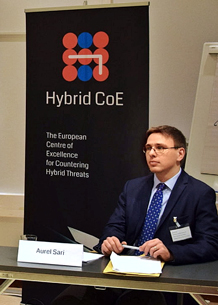
Dr Sari at the Hybrid Centre of Excellence
The role of law in countering hybrid threats
The threat of hybrid warfare is widely seen as one of the defining features of the contemporary European security environment. Hybrid warfare refers to the integrated use of military and non-military means by an adversary as a way of targeting the vulnerabilities of another nation. Russia’s annexation of Crimea is frequently cited as the classic example of this strategy. In Crimea, Russia employed military force in combination with deception and disinformation to take control without the need for large-scale violence. Hybrid threats are thus characterized by the use of unconventional, often deniable, methods that exploit a nation’s weak points below the threshold of open hostilities.
Hybrid warfare poses profound challenges to the international legal order. Dr Aurel Sari, a senior lecturer at Exeter Law School, will be working with the Helsinki-based European Centre of Excellence for Countering Hybrid Threats to develop solutions for addressing these challenges.
Dr Sari is one of the leading experts on the legal aspects of hybrid threats. His research on the legal dynamics of hybrid conflicts has informed the work of governments and international organisations, including the Council of Europe and NATO. He has engaged widely with scholars, policy-makers and practitioners, contributing to training events, academic discussions and policy work across Europe, in Israel and the US. Most recently, he gave a conference keynote speech on the subject in the Czech Republic and briefed the hybrid network at NATO HQ in Brussels on recent developments.
Since 2017, Dr Sari has been working with the European Centre of Excellence for Countering Hybrid Threats on setting up a legal resilience network. The network promotes a resilience perspective as a means for countering the legal challenges presented by hybrid threats and actors. It is composed of subject matter experts and representatives of the participating nations and institutions. As part of this work, earlier this year Dr Sari published a strategic analysis paper with the European Centre on Hybrid Threats and the Politics of International Law.
Building on this collaboration, Dr Sari will be working more closely with the European Centre over the coming months. Dr Hanna Smith, Director of Strategic Planning and Responses at the Centre, commented: “Increasing legal resilience is one of the key themes for democratic societies. Today’s hostile influence campaigns all too often abuse the weaknesses of national and international legal frameworks. We need to understand this phenomenon better and find ways to pre-empt, respond and counter these challenges. We look forward to working with Dr Sari and the Exeter Centre for International Law on this important task.”
One of the common projects will involve an international conference at the University of Exeter in April 2019. The aim of the event is to explore the legal challenges presented by hybrid threats and to develop the notion of legal resilience as a conceptual and policy framework for countering these challenges more effectively.
